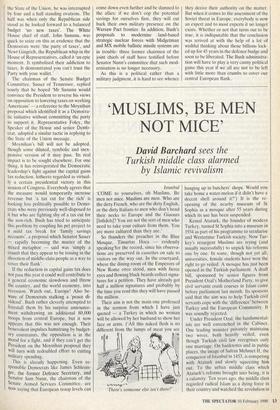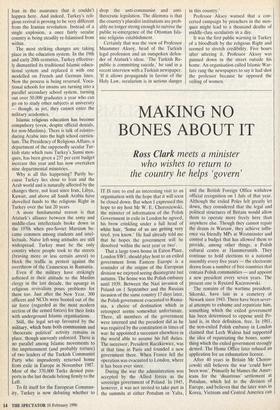`MUSLIMS, BE MEN NOT MICE'
David Barchard sees the
Turkish middle class alarmed by Islamic revivalism
Istanbul 'COME to yourselves, oh Muslims. Be men not mice. Muslims are men. Who are the dirty French, who are the dirty English, or the dirty Italians to men who don't bend their necks to Europe and the Giaours [Infidels]? You are not the sort of men who need to take your culture from them. You are more cultured than they are,' So thunders the preacher in the Blue Mosque, Timurtas Hoca — evidently speakinglor the record, since his observa- tions are preserved in cassettes on sale to visitors on the way out. In the courtyard, where the dining-room of the Emperors of New Rome once stood, men with fierce eyes and flowing black beards collect signa- tures for a.petition. They have already got half a million signatures and probably by the time you read this they will have passed the million.
Their aim is not the main one professed in the sermon from which I have just quoted — a Turkey in which no woman will he allowed by her husband to show her face or arms. ('All this naked flesh is no different from the lumps of meat you see
'There's someone else isn't there?' hanging up in butchers' shops. Would you take home a water-melon if it didn't have a decent shell around it'll It is the re- opening of the nearby museum of St Sophia as a mosque after 55 years during which its use has been suspended.
Kemal Ataturk, the founder of modern Turkey, turned St Sophia into a museum in 1934 as part of his programme to secularise and Westernise Turkish society. Now Tur- key's resurgent Muslims are trying (and usually successfully) to unpick his;reforms one by one. In some, though not yet all; universities, female students have won the right to go veiled. A mosque has just been opened in the Turkish parliament. A draft bill, sponsored by senior figures from President Ozal's Motherland Party, to give civil servants crash courses in Islam came before parliament last month. Its sponsors said that the aim was to help Turkish civil servants cope with the 'difference' between Turkey and the European Community. It was soundly rejected.
Under President Ozal, the fundamental- ists are well entrenched in the Cabinet. One leading minister privately maintains two wives, both heavily veiled, even though 'Turkish civil law recognises only one marriage. On banknotes and in public places, the image of Sultan Mehmet 11, the conqueror of Istanbul in 1453, is competing with Ataturk and slowly squeezing him out. To the urban middle class which Ataturk's reforms brought into being, it is a calamity. Ten years ago, the middle class regarded radical Islam as a dying force in their country and watched the revolution in Iran in the assurance that it couldn't happen here. And indeed, Turkey's reli- gious revival is proving to be very different from the Iranian revolution. Instead of a single explosion, a once fairly secular country is being steadily re-Islamised from within.
The most striking changes are taking place in the education system. In the 19th and early 20th centuries, Turkey effective- ly dismantled its traditional Islamic educa- tional system and replaced it with one modelled on French and German lines. Now the process is being reversed. Voca- tional schools for imams are turning into a parallel secondary school system, turning out over 50,000 graduates a year who can go on to study other subjects at university — though, as yet, they cannot enter the military academies.
Islamic religious education has become compulsory (even, despite official denials, for non-Muslims). There is talk of reintro- ducing Arabic into the high school curricu- lum. The Presidency of Religious Affairs, a department of the supposedly secular Tur- kish state which runs Turkey's Sunni mos- ques, has been given a 237 per cent budget increase this year and has now overtaken nine departmental ministries.
Why is all this happening? Partly be- cause Turkey lies close to Iran and the Arab world and is naturally affected by the changes there, not least since Iran, Libya, Kuwait, and above all Saudi Arabia have shovelled funds to the religious Right in Turkey over the last 20 years.
A more fundamental reason is that Ataturk's alliance between the army and middle-class intellectuals broke down in the 1970s when pro-Soviet Marxism be- came common among students and intel- lectuals. Naïve left-wing attitudes are still widespread. Turkey must be the only country where people took to the streets (braving more or less certain arrest) to block the traffic in protest against the overthrow of the Ceausescus in Rumania.
Even if the military have strikingly softened in their attitude to the Muslim clergy in the last decade, the upsurge in religious revivalism poses problems for them too. Just after the New Year, 300 officers and NCOs were booted out of the air force (regarded as the most modern section of the armed forces) for their links with underground Islamic organisations.
Still, the legal set-up favoured by the military, which bans both communism and `theocratic political' activity remains in place, though unevenly enforced. There is no parallel among Islamic movements to the imprisonment (and probably torture) of two leaders of the Turkish Communist Party who imprudently returned home from exile in Europe in November 1987. Most of the 370,000 Turks denied pass- ports in the last decade belong firmly to the Left.
To fit itself for the European Commun- ity, Turkey is now debating whether to drop the anti-communist and anti- theocratic legislation. The dilemma is that the country's pluralist institutions are prob- ably no longer strong enough to survive the public re-emergence of the Ottoman Isla- mic religious establishment.
Certainly that was the view of Professor Muammer Aksoy, head of the Turkish legal profession and an outspoken defen- der of Ataturk's ideas. 'The Turkish Re- public is committing suicide,' he said in g recent interview with a Turkish newspaper. `If it allows propaganda in favour of the Holy Law, secularism is in serious danger in this country.'
Professor Aksoy warned that a con- certed campaign by preachers in the mos- ques might lead to a thousand deaths of middle-class secularists in a day.
It was the first public warning in Turkey of a bloodbath by the religious Right and seemed to stretch credibility. Five hours after uttering it, Professor Aksoy was gunned down in the street outside his home. An organisation called Islamic War- fare rang the newspapers to say it had shot the professor because he opposed the veiling of women.



















































 Previous page
Previous page